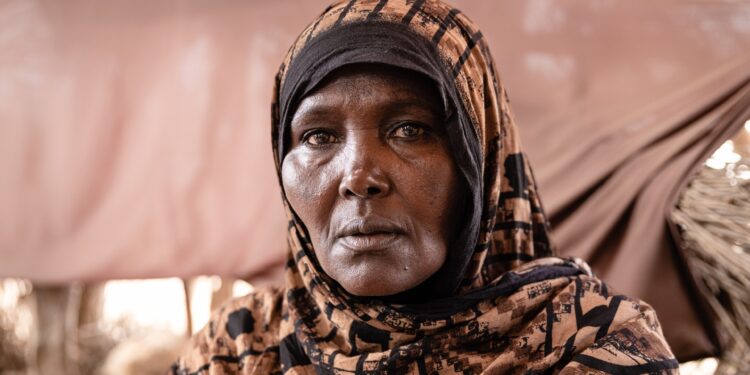Amina Jamaa Hussein fires off a flurry of questions on the telephone as she sits cross-legged on a plastic mat in a camp at Garowe, the capital of Somalia’s Puntland province.
“’The place are you now? Are you all proper? Is the combating nonetheless occurring?” she asks, anxious about her household within the metropolis of Las Anod, capital of the Sool area in close by Somaliland.
The camp is a group of shacks made from tarpaulins and corrugated iron. So far as the attention can see there may be not a single patch of inexperienced. A five-year drought has left this land scorched, and on the top of this wet season, the clouds hanging low above the camp carry little promise of rain.
Along with 4 of her youngsters and 5 grandchildren, Hussein deserted her home and all her belongings and fled Las Anod. The household left after they awoke to terrifying sounds of shelling and gunfire in February as Somaliland’s military fought with native clan militia.
“We ran with solely the garments on our backs and left the home open. We didn’t even lock the door,” Amina says.
With out the fortune of getting pals or relations to stick with in Garowe, their solely alternative was to settle in a camp for displaced individuals. Such camps have dotted the suburbs of Garowe for many years, populated by individuals who have fled battle and violence in different elements of the nation or by these whose livestock have died within the worsening drought.
Each Saturday, Amina traces up with different girls in entrance of an improvised calling station arrange by Somali Crimson Crescent volunteers. She makes a free telephone name so she will be able to hear from the remainder of her household nonetheless in Las Anod.
“After I handle to talk to them, I really feel reassured, however then the evening comes once more, and I fear myself sick,” she says.
After 30 years of battle in Somalia, the results of which have been compounded by the worsening results of local weather change, displacement has grow to be an elemental a part of life in Somali society. The variety of displaced individuals has reached a brand new excessive of three.8 million this yr, in response to the Worldwide Group for Migration.
Inner displacement is without doubt one of the important drivers behind the nation’s quick urbanisation. By 2026, its city inhabitants will overtake the agricultural one, in response to projections.
“Individuals shifting into the camps after their livelihoods have been destroyed by battle or drought wrestle to adapt to the brand new realities,” says Pascal Cuttat, the top of delegation for the Worldwide Committee of the Crimson Cross in Somalia. “We attempt to present emergency help, however what are the long-term options obtainable to them?”
Individuals dwelling within the camp subsequent to Amina’s are herders from conventional pastoralist communities. Somalia is without doubt one of the international locations most weak to the results of local weather change, and droughts have grow to be so frequent and so extreme that pastoralists discover it laborious to protect their conventional nomadic life-style. When animals die due to the shortage of pasture, the one remaining possibility for a lot of is shifting into the rising camps on the outskirts of cities.
Hospitality being one of many pillars of the Somali tradition, many displaced individuals discover meals and shelter with host communities. Individuals attempt to share the little they’ve even because the native economic system is beneath pressure due to the extended drought.
“Individuals on this city have welcomed us. They’re good individuals,” says Asha Awad Jama, a 50-year-old store proprietor who lately fled from Las Anod to Burawadal village together with her aged mom and 7 youngsters. The painful lack of her dwelling and life there and the uncertainty about the way forward for her household devour Asha.
“Our life in Las Anod was stunning,” she says. “We lived in a home we owned. However the battle is the worst factor. It makes you lose all the pieces. So we left all we had behind and ran to avoid wasting our lives.”









